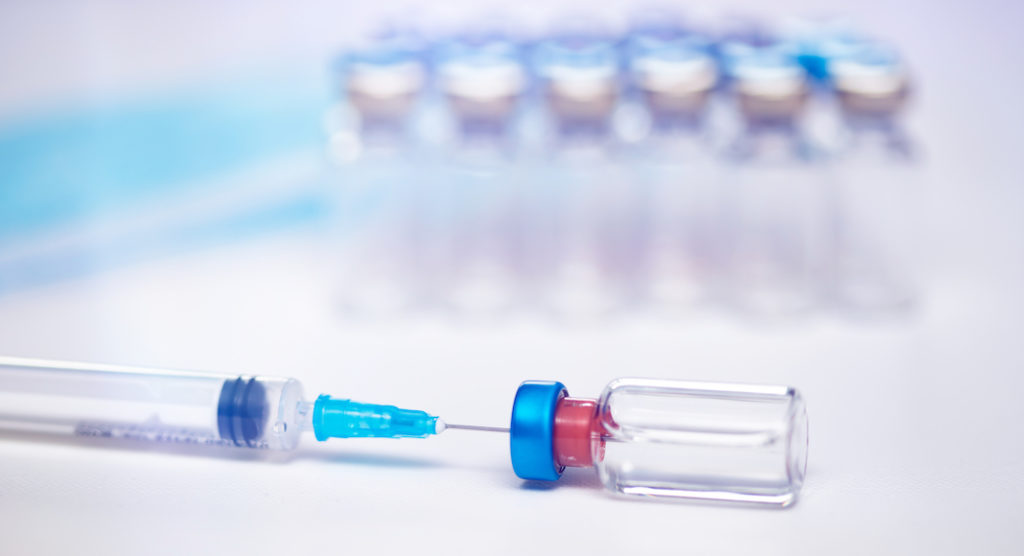
Texas Border Business
Washington, D.C. — Congressman Henry Cuellar (TX-28) sent a letter to Governor Greg Abbott, calling for the deployment of the Texas National Guard to help border communities with the distribution and administration of COVID-19 vaccines.
“Ensuring COVID-19 vaccines are safely and quickly distributed and administered to constituents is my top priority right now,”said Congressman Cuellar. “We must deploy the Texas National Guard to our border communities for mass vaccination efforts so we can quickly save lives and help change course for this pandemic. With this public health crisis, we need all hands on deck and wartime-like focus, which includes the manpower, technical support, and logistical capabilities of our nation’s military. As a senior member of the Defense Subcommittee on Appropriations, I am dedicated to making sure vaccines are being administered as efficiently as possible and that every South Texan receives a vaccine regardless of where they live.”
In the letter Congressman Cuellar wrote:
I now ask you to redeploy these troops to help our Texas border communities overcome the continued challenges faced in their fight against the COVID19 pandemic. The federal government will provide 100% of necessary resources for the national guard to administer the vaccine to local populations, including the many veterans who live near the South Texas border.
…
Various areas across the Southwest Border continue to experience delays in distribution and administration of the COVID-19 vaccine. Due to limited medical providers in the region, they require support personnel to effectively administer the vaccine to local populations. Texas National Guard troops have demonstrated that they can supplement efforts of national importance. My constituents and I now look to you supplement efforts of critical State significance, in coordination with those of the Texas Department of State Health Services. This is a serious issue and will continue to impact our State until we can have the support and enduring efforts of the Texas National Guard.
Read Congressman Cuellar’s letter to Governor Abbott here.
FEMA’s Role in COVID-19 Vaccine Distribution
In alignment with President Biden’s plan to respond to COVID-19, FEMA is work with other federal agencies to coordinate with state, local governments and private sector partners to assist, augment and expedite vaccinations in the United States.
- At the President’s direction, FEMA has increased its support to states, tribes and territories for vaccination sites. FEMA has already obligated more than $1.76 billion to states, tribes and territories, and Washington, D.C. for vaccination sites. As the number of states with obligations increases, we will work alongside other federal agencies to provide federal support for critical staffing, supplies and other shortfalls that can help get more Americans vaccinated.
- Prior to the executive orders to expand vaccination efforts, FEMA obligated more than $57.5 billion towards COVID-19 response efforts to support our state, tribal and territorial partners during this pandemic. This funding was at a 75% cost share.
- On Feb. 2, President Biden directed FEMA to retroactively reimburse states for 100% of their costs for eligible emergency protective measures including masks, gloves, emergency feeding actions, sheltering at risk populations and mobilization of the National Guard, if not funded by HHS/CDC or other federal agency.
- FEMA is supporting vaccination sites by providing expedited financial assistance, federal equipment and supplies, and deploying federal personnel to states, tribes, territories and other eligible applicants for vaccination efforts. This assistance is processed when a request is submitted.
- FEMA has launched a Vaccine Support page to keep the public informed the agency’s support of the White House COVID-19 Response Plan and information on how to get vaccinated.
Federal Funding to Accelerate Vaccine Efforts
- FEMA, in accordance with President Biden’s Jan. 21 Memorandum, will provide reimbursement to states, local, tribal and territorial governments and the District of Columbia for the use of their National Guard to respond to COVID-19 and other assistance, which may include support to vaccination distribution and administration, at a 100% cost share until Sept. 30.
- FEMA is supporting COVID-19 vaccine distribution by providing reimbursement to governments for costs associated with vaccine distribution and administration.
- As of Feb. 2, the Disaster Relief Fund balance is more than $12.9 These funds will support continued response to COVID-19, including expanded vaccination efforts across the country by providing financial assistance to governments and other eligible applicants for vaccination efforts as well as personal protective equipment, alternative care sites and durable medical equipment.
- Providing funding to states, tribes and territories is an Administration priority. After a request is submitted, reviewed and validated, FEMA can expedite reimbursement for eligible emergency work projects to ensure resources are available to support vaccine distribution and administration.
- As of Feb. 2, FEMA has provided more than $1.76 billion to states, territories and tribes for expenses related to COVID-19 vaccination at 100% federal cost share. In the last 48 hours, the following obligation over $1 million was made:
- $213.2 million to Massachusetts.
- These funds cover emergency protective measures to include:
- Supplies and commodities needed to safely store and administer the vaccine.
- Transportation support and reasonable, necessary security for refrigerated trucks and support for leasing space to store and/or administer vaccines including utilities, maintenance and security.
- Medical and support staff including onsite infection control measures, personal protective equipment for staff, cloth face coverings for patients, temperature scanners, physical barriers and disinfection of the facility in accordance with CDC guidance.
- Dissemination of public information and communication regarding vaccinations.
- The costs of purchasing the vaccine and support kits are not covered by these obligations and do not duplicate any HHS funding. COVID-19 Vaccines and support kits are provided to state, tribal and territorial governments at no cost by the federal government.
- The Coronavirus Response and Relief Supplemental Appropriations Act of 2021 appropriates $2 billion to FEMA to provide financial assistance to households for COVID-19-related funeral expenses at a 100% federal cost. FEMA is reviewing the legislation and evaluating potential options for implementation.
Federal Coordination to Identify and Fill Resource Gaps
- FEMA is working closely with state, local, tribal and territorial governments to fill gaps that local health officials have identified. Additionally, emergency managers are working closely with appropriate health officials.
- FEMA will work with the U.S. Department of Health and Human Services and other federal agencies to ensure a coordinated approach to using Defense Production Act authorities wherever necessary so private sector companies can increase vaccine supply and spur vaccine manufacturing.
- FEMA released “FEMA COVID-19 Vaccination Planning FAQ,” a document to help assist governments with their vaccine distribution efforts and reimbursements for associated costs.
FEMA and Other Federal Agencies Are Supporting Vaccine Sites
- FEMA, through its National Response Coordination Center and 10 regional offices across the nation, is coordinating with other federal agencies to meet state, tribal and territorial needs. FEMA is providing support to established vaccination locations and National Guard operations to expand access to vaccines.
- A site is considered federally supported based on three characteristics:
- It is a state, local, tribal or territorial established site that is receiving any combination of federal personnel, materiel or funding.
- The federal support enables the site to open, remain open, or expand capacity.
- The site is, or has been, operational on or after Jan 20.
- FEMA is committed to ensuring every American who wants a vaccine can get one. To reach underserved and rural communities, FEMA and its federal partners are helping determine site locations to ensure equitable access. This includes coordination efforts to establish and support fixed facilities and establishing pop-up or temporary vaccination sites and mobile vaccination clinics.
- Additionally, FEMA established a Civil Rights Advisory Group. Civil rights advisors are deployed to all regions assisting with equity in vaccine operations, including community engagement, community assessments, equal access/accessibility and site inspections.
- As of Feb. 3, FEMA has deployed 401 staff to 12 states and one territory to support vaccination centers with personnel and technical assistance. This does not include support personnel from other federal agencies or partners. Additional FEMA staff across the country are supporting virtually.
- As of Feb. 2, 114 federally supported sites are operational across the country.
- U.S. Department of Health and Human Services deployed 96 National Disaster Medical System medical vaccinators for community vaccination centers in Arizona. The U.S. Coast Guard deployed 18 reservists to support Oklahoma.
Vaccine Site Capacity
Vaccine site types, locations and capacity are decided at the state, local, tribal and territorial government level.
- Depending on need determined, there are a variety of site types and sizes available to support vaccine efforts:
- Type 1 can administer 6,000 vaccinations a day.
- Type 2 can administer 3,000 vaccinations a day.
- Type 3 can administer 1,000 vaccinations a day.
- Type 4 can administer 250 vaccinations a day.
- Type 5 Mobile/Pop-up can administer 250 vaccinations a day.
Vaccine Guidance
- According to CDC, as of Feb. 2, more than 32.7 million vaccine doses have been administered. More than 52.6 million vaccine doses have been distributed to locations across the country.
- FEMA is working with the Ad Council to encourage hesitant or underrepresented Americans to get vaccinated. This research-driven public education campaign provides federal, non-profit, and medical stakeholders with insights and communications strategies to tailor communications to reach diverse audiences.
- The vaccine is not a perfect fix. Everyone should continue to practice other precautions like wearing a mask, social distancing, handwashing and other hygiene measures until public health officials say otherwise.













